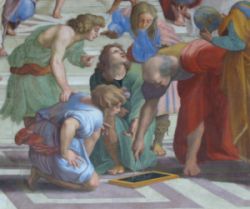November 21st November 21, 2008
Posted by Tatyana Malysh in Uncategorized.trackback
So, what is mathematics?
The word “mathematics” came from Greek μάθημα (máthēma), and means simply “learning” or “study”. Thus, all what kids in Ancient Greek did at schools was only math. And we are complaining?! But then it, probably, was much easier than now. All those guys, who invented calculus and trigonometry, yet weren’t roaming around and poisoning those kids’ existence. The focus, probably, was more on the basic math operations, such an addition, subtraction, and company. Let’s talk about addition. By the end of elementary school, every kid is considered an expert in it, at list within one hundred. However, I bet, you haven’t thought about some possibilities of addition before. Can you answer this, for example?
1+1=
2+2=
Some will say “yes”, but the others will state “it depends”. “On what, for God’s sake? “ – You ask. Oh, it can depend on various things. I knew little boy, who once noticed that if you add one fox to one chicken, you most likely will not get two animals. I’ve also heard that if you mix two cups of water with two cups of alcohol, you will never receive four cups of mixture. I haven’t tried it yet, but you are welcome. So, the answer may depend on quality of the components. Can you think of something else?

I’ve never thought it depends!! Hmm, add one fox to one chicken? It is really interesting. You gave me a very fresh concept of math about quality of the components.
However, I still cannot understand how the mixture can not become 4 cups if two cup of water is added to two cups of alcohol. Is there anyone who can give me the answer?
The experiment, my friend, is the best way to prove it. Seriously, I’ve read in the chemistry book that molecules of the mix are more compact than molecules of the components, so when mixed, they occupy smaller volume.
I got it!! Yes, now I remember I had learned that in my middle or high school, anyways, long long time ago. ^^ Thanks!
This discussion reminds me modern algebra course where the Prof. pushed beyond common mathematical operations (e.g. addition & multiplication) into modulus, remainder, truncation, ceiling… I recall walking out of Modern Algebra less sure of what each meant. It was similar to your fox and chicken example. At one point the professor had the class fumbling around for a definition of addition—no kidding. Think about this, typical undergrad proofs take addition and multiplication for granted so how do you prove addition and multiplication?